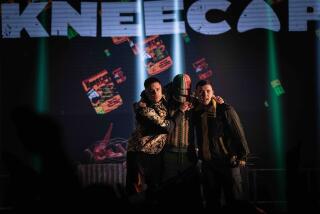Irish Expatriates Honor Heroes
WHITTIER — Come out, ye Black and Tans!
Come out ‘n’ fight me like a man!
For the record:
12:00 a.m. May 13, 1991 For the Record
Los Angeles Times Monday May 13, 1991 Home Edition View Part E Page 3 Column 6 View Desk 2 inches; 38 words Type of Material: Correction
Irish Expatriates--A picture caption in Thursday’s View section incorrectly characterized items for sale at the annual meeting of the Los Angeles chapter of Irish Northern Aid. The items included Irish republican T-shirts, posters, buttons and political pamphlets.
Come and tell us about the medals ye won in Fla-anders!
Tell ‘em how the I-R-A made ye run like hell away. . . .
It was a dinner party to honor a man who starved himself to death, and the local Irish band had just launched into its first guitar-thrumming rebel chorus.
Almost 10 years ago to the day, Bobby Sands had become the first would-be political prisoner in Northern Ireland’s Maze prison to die, after nearly seven weeks on hunger strike, thereby joining the ever-expanding pantheon of Irish republican martyrs.
A man worth remembering, for members of the Los Angeles chapter of Irish Northern Aid. A sacrifice, too, worth celebrating. And--perhaps most important for the group whose raison d’etre is to raise American dollars for the “republican cause” in British-ruled Ulster--an idea worth selling.
“We remain proud, good, decent, democratic people, and Irish-Americans. We honor Bobby Sands tonight, his selfless efforts in giving his life for freedom and for his patriotism for mother Ireland,” said Kathleen Flanigan, the keynote speaker at the banquet, an annual event held last weekend in a Whittier union hall.
In the hall sat about 60 of the devoted: Irish expatriates still hefting heavy accents; would-be revolutionaries drawn from the ranks of other crusades; bespectacled members of the Ancient Order of Hibernians and some from the “green beer crowd”--Irish-Americans who believe that membership in Noraid, the group’s more common nom de guerre, is as patriotic as marching on Hollywood Boulevard on St. Patrick’s Day.
But as often proves to be the case in matters Irish, things aren’t that simple.
In a world where politically motivated organizations often court controversy, Noraid’s dilemma is particularly prickly. Its membership is virulently anti-British and pro-Irish Republican Army, yet under the watchful eye of the FBI, activists must walk a tightrope between their ideological passions and their fears of a federal crackdown.
Just below Sands’ smiling visage on the dinner podium read the appeal “Join Sinn Fein,” the legal but restricted political wing of the outlawed Provisional IRA, which is fighting to oust the British. A banner overhead proclaimed the defiant vow: “Ireland unfree will never be at peace.”
Noraid maintains that its money goes only to help families of imprisoned republicans via Green Cross and An Cumann Cabrach (Gaelic for A Friendly Help), two technically independent charities that are run within Sinn Fein circles.
Security officials in Northern Ireland contend, however, that Sinn Fein and the IRA dip out of the same till. The U.S. Justice Department has long asserted that at least part of Noraid’s donations end up, via a sophisticated laundering system, in the arms-purchasing coffers of the Provisional IRA.
The FBI keeps close tabs on Noraid activities, assuming that they may uncover gun-runners within their ranks, as the agency has in the past. In 1977 the U.S. government forced the organization, which has its headquarters in New York City, to register as an official foreign fund-raiser of the guerrilla force.
Noraid members passionately deny the allegation that they support the IRA financially, even as many of them sing the praises of their national “freedom fighters.”
“No one has ever proved that a single cent of our money goes toward guns, and for a good reason: Noraid does not fund the IRA,” says Gael Heath, the Los Angeles chapter’s recently elected chairwoman. “If they had any proof of wrongdoing, they would have shut us down.”
“There’s no way our money could be used for anything illegal. It’s a charity,” adds one of the Hibernians, the fraternal order for Irish-Americans. “We’re just Irishmen helping Irishmen.”
This year, however, fewer than usual showed up to help, meaning lower donations and fewer sales of raffle tickets--for T-shirts, bottles of Jameson’s whiskey, jazz records and a biography of Sinn Fein leader Gerry Adams. (The “booby prize” of past years, a portrait of Queen Elizabeth II, was absent this time.) The group’s treasurer, Travers Devine, estimates that the dinner netted about $600.
Devine attributes the drop, in part, to what happened at last year’s gathering: FBI agents swooped in and arrested the evening’s scheduled keynote speaker, Sinn Fein activist Siobhan O’Hanlon, who had concealed her IRA convictions on her visa application.
The FBI scrutiny is especially significant because Noraid, with about 100 chapters nationwide, is an influential player in Irish-American enclaves in Boston, New York, Philadelphia and elsewhere. Back East, its leaders are elected grand marshals of parades and its functions attract local politicians and entrepreneurs.
Amid Southern California’s suburban sprawl, however, it operates mostly on the political fringe. Many of the local chapter’s efforts are directed toward trying to woo Irish-Americans into the fold with modest dinners and house parties. It also plays host to republican speakers from Northern Ireland, like maverick priest Des Wilson and civil rights campaigner Bernadette Devlin McAliskey, and its members picket visits by British ministers and royalty.
“Generally, when some high-ranking Brit shows up in L.A., we stand outside and scream what a bloody murderer they are,” said one member who, like many of those interviewed, did not want to be quoted by name.
Noraid’s local chapter seems to embrace an eclectic mix that joins conservatives and liberals alike in a common Anglophobic bond. So too does it include some recruits who express confusion about what is actually going on in Northern Ireland.
One woman sitting by herself says she decided to join Noraid after visiting Belfast as a tourist two years ago.
“On the train there were these British soldiers walking up and down, intimidating everybody. I was just thinking that if I had to live under that, I probably would be a bomb thrower. Yeah, I would,” says the woman, a baby-voiced nurse.
When told that the troops were stationed on trains partly in response to the IRA’s bombing campaign to disrupt civil railways, she seems surprised.
“The IRA only shoots soldiers,” she maintains.
Some members of the group make a pilgrimage of sorts each August to the province for a brief fact-finding tour of “the Troubles.” The exercise is carried out within Sinn Fein circles--no talks with British, Protestant unionist or moderate Roman Catholic nationalist voices.
As one excited mother of three grown children put it, “I’m going on the tour. Yeah, each August they go up and make all kinds of trouble. I’ve looked at it from the outside for long enough.
“I’ve heard that it’s kind of phony in a way,” she added. “They evidently have a guy in a mask--what do they call those things, balaclavas?--come on to the bus to talk to us, give us the IRA scoop. It should be fun, though.”
Then she returned to hawking T-shirts emblazoned with republican slogans.
But the shirts--and the various hunger-strike commemoratives and IRA funeral posters--were not selling well at the weekend dinner.
One elderly man standing by explained, “Frankly, they need some new shirts. I’ve already got a drawer full of those.”
Similarly, a World War II veteran and former New York cabbie at one table suggested that what the IRA needs today “is a real kick-ass-- they need Patton.”
“Get with the times. They need Schwarzkopf,” kidded his tablemate.
As the crowd of businessmen, retirees and homemakers dined, they tapped their feet to the succession of folk tunes, among them Christy Moore’s bitter tale of Irish working-class blight, “Ordinary Man”:
As long as I live,
I never will forgive--
You’ve stripped me of my dignity and pride.
And to at least one clean-cut man sitting quietly, such words had more than romantic resonance.
The tattoo on his muscular left arm read “Long Kesh,” a reference to the Maze prison and testimony that at one time he had been convicted of terrorist offenses in Northern Ireland.
The 34-year-old man, who requested anonymity, is compact and lean with piercing blue eyes. He says that in 1974, at age 16, he was the youngest prisoner in the Maze and stayed inside for five years. After his release, he immigrated to the United States and now works on high-rise building sites in Southern California. He has a wife and three children and has no interest in ever returning to Ireland, north or south.
“I left because the SAS had an assassination squad out on me,” he says, referring to the British army’s counterterrorist Special Air Service unit. “I can’t go back. They’ll kill me if I do; it’s as simple as that.”
He is content today to be a devoted member of Noraid: “Noraid is crucial. It keeps the IRA afloat--their families, I mean. The cause couldn’t function without Irish America. Every rebel in Ireland, north or south, knows it. I’m just playing my part.”
But the fact that so few of the 2 million Irish-Americans in Southern California are willing to go the Noraid route is a source of bitterness for some members.
“I know a lot of Irish-Americans and other natives of Northern Ireland who do absolutely nothing,” says silver-haired Imelda Hughes, a Noraid stalwart who emigrated to California with her husband, Eamon, from their native Belfast in the late 1960s. “They’re very comfortable here; they’ve ‘made it’ in upper-middle-class America. Most people only get self-righteous about things that upset themselves.”
Still, she adds, “My ambition is for Noraid to be defunct. Because Noraid will disappear only when Ireland is united.”
More to Read
Sign up for Essential California
The most important California stories and recommendations in your inbox every morning.
You may occasionally receive promotional content from the Los Angeles Times.










